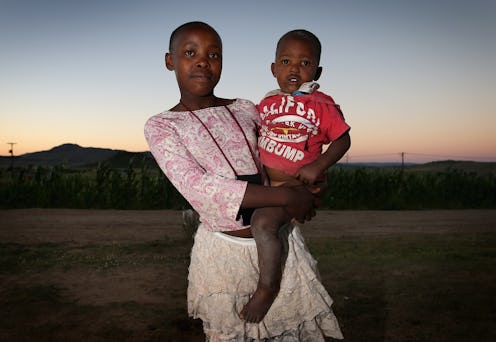News
Trump's Budget Cuts Would Be Awful For Women In Developing Countries

President Trump's proposed budget can read like a primer on how to make political decisions both deeply unpopular and immoral. From shutting down the National Endowment for the Arts to ending funding for Meals on Wheels, Trump's projected vision of spending would damage so many beloved programs and dependent citizens that, thankfully, there is little chance Congress approves anything like it. Still, it is imperative to outline how one group in particular would be especially devastated by Trump's budget cuts — women in developing countries.
Trump is currently calling for a $1 billion cut to funding for AIDS treatment and prevention programs, help that is desperately needed in parts of Africa, as well as Guyana, Haiti, and Vietnam. The United States spends about $6 billion a year on these interventions, a figure that is pocket change compared to the hefty multi-trillion dollar budget proposed by the Trump administration.
Yet by cutting that $1 billion in aid, researchers at amfAR, a foundation that specializes in AIDS research, predict that one million people will die. That bears repeating: one million lives will be lost because of this proposal from Trump's budget. And that doesn't include the estimated 300,000 children who would be orphaned if their parents perish.
This has a disproportionate effect on women, even without the cuts to funding for contraception efforts (we'll get to those). And that's because HIV and AIDS occur at a higher rate in women than men, especially in East and Southern Africa. According to a 2016 UNAIDS report, young women experience an outsized threat of contracting HIV. As stated in UNAIDS' findings, "Gender inequalities, including gender-based violence, exacerbate women’s and girls’ physiological vulnerability to HIV and block their access to HIV services." Young women are twice as likely to be infected with HIV as their male counterparts.
An additional $524 million that is currently allocated for contraception and other family planning methods specifically for women in developing countries now also sits on the Trump budget chopping block. Melinda Gates, who founded the Bill and Melinda Gates Foundation along with her husband, wrote on Facebook that, "The data shows that this drastic step would lead to more unintended pregnancies, more maternal deaths, and more missed opportunities for the 225 million women who do not want to get pregnant but still lack access to contraceptives. This budget threatens to trap millions more families in a cycle of poverty."
Republicans may argue that organizations connected at all to abortion services go against their "pro-life" platform. But even taking that position at face value, there is no reason why funding could not be allocated specifically for other contraceptive measures, rather than cut out altogether.
And this cavalier disregard for the wellbeing of women specifically mirrors a similar attitude in Trump's domestic budget priorities. His massive cuts to Medicaid will also disproportionately effect women, since the government insurance program for the poor enrolls more women than men. In fact, women make up nearly 70 percent of Medicaid enrollees.
Of Trump's proposal to cut Meals on Wheels, Republican Rep. Mark Meadows, chairman of the conservative Freedom Caucus, said, “Meals on Wheels, even for some of us who are considered to be fiscal hawks, may be a bridge too far.”
Indeed it is, and most Americans would agree. It's to his shame, though, that Meadows and far too many other Republicans cannot find the same compassion for poor and suffering women as they have for the elderly, for Trump's budget cuts will have an outsized impact on this marginalized population.